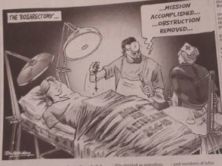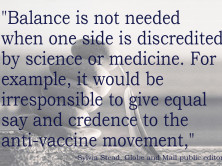George Rodrigue, editor, defended the Dallas Morning News' report on Parkland Memorial Hospital. (Credit: Dallas Morning News, screenshot detail)
A Dallas Morning News editor responded to criticism by a local doctor, Dr. Ron Anderson, over one of the newspaper’s stories. The story reported that Parkland Memorial Hospital, of which Anderson is president and CEO, didn’t pass “a recent Medicare audit.”
Anderson criticized the newspaper in a letter published on the hospital’s website. Countering that criticism, the Dallas Morning News editor, George Rodrigue, asserted Anderson’s criticism only told part of the story.
The Back Story
The Jan. 9 story by the Dallas Morning News (see here) cited a federal report in reporting that the hospital “repeatedly violated the rights of people who complained about medical treatment.”
As the Dallas Morning News explained, that report “describes a surprise 2010 inspection in which Medicare regulators tested whether Parkland was responding in writing to every patient grievance, as required by law. The public hospital failed to do so in all six cases the regulators sampled.”
According to the Dallas Morning News, a spokesperson for the hospital — April Foran — claimed that the hospital had looked into the complaints, but didn’t send letters to “patients or their loved ones” within 10 days. Foran reportedly didn’t have any “proof that [the hospital] ever wrote back to the patients.”
Some of the complaints by patients about the hospital “included allegations that doctors performed procedures without consent, prescribed medication that caused a heart attack and pressed a mother to disconnect her son from life support for cost reasons.”
In response to the article, Anderson then posted a letter in defense of Parkland Memorial Hospital Dec. 10 on his hospital’s website.
Anderson’s account of events mirrored that of the Dallas Morning News. Anderson explained: “Based upon a single patient complaint, CMS came to Parkland in June 2010 for an unscheduled survey as they are required to do. This original complaint was deemed unsubstantiated by CMS.”
Likewise, Anderson noted that the hospital couldn’t provide “copies of letters to the patients … to document that the patients had been contacted within 10 days according to Parkland policy.”
Anderson also published a letter from University Health System Consortium senior vice president and chief medical officer Mark Keroack. The letter was sent to but not published by the Dallas Morning News, according to Anderson.
In it, Keroack stated that “Parkland staff reviewed our policy to ensure its compliance with CMS guidelines. The Patient Relations department, which is responsible for resolving patient issues, is now 100 percent compliant with regulatory guidelines, requirements and our own policies.”
See Anderson’s complete letter here.
Addressing Anderson’s letter, Dallas Morning News managing editor George Rodrigue called Anderson’s letter “instructive – both for what it includes and for what it omits.”
Rodrigue wrote:
“Dr. Anderson mentioned that the federal audit of Parkland started with a single complaint, and that the complaint was found to be unjustified. Our story mentioned that, too, but Dr. Anderson’s note does not acknowledge that we did so.
“More importantly, Dr. Anderson’s note fails to mention that Medicare auditors selected a sample of six cases to determine whether Parkland was properly notifying patients who had complained about care. His note does not mention that Parkland could not document proper communication in any of those six cases.”
Rodrigue’s defense of the story explained that the point of the Dallas Morning News story wasn’t about the “one unsubstantiated complaint.” Instead, according to Rodrigue, the newspaper ran the story “because Parkland had failed to properly notify 100 percent of the patients in the sample chosen by federal auditors.”
Further, regarding Anderson’s comment that Keroack’s letter wasn’t published, Rodrigue wrote that the News did publish the letter on its website.
See Rodrigue’s full response here.
iMediaEthics’ is writing both sides of the debate for comment and will post updates.
UPDATE: 1/17/2011: 10:38 AM EST: April Foran of Parkland Memorial Hospital responded to iMediaEthics’ inquiry that Anderson has no further comment.






